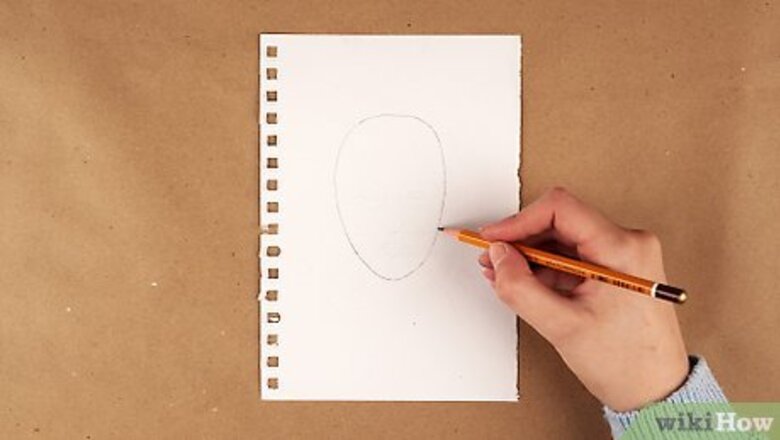
views
- Draw an oval. Then, add vertical and horizontal guidelines through the center to create guidelines for the features.
- Make eyes realistic by making them almond-shaped. Place one eye’s width between each eye to keep them symmetrical.
- Focus on the shape of the base of the nose and shade under each eye to give definition to the nose’s bridge (instead of drawing a line in the middle).
- Place the mouth halfway between the nose and chin. Add 3 lines—1 for the mouth, 1 for the upper lip, and 1 for the lower lip.
Adult Woman
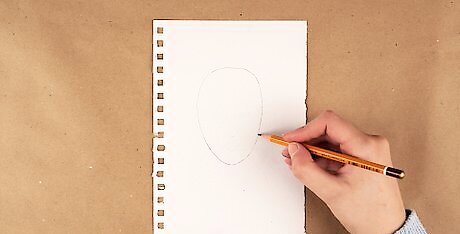
Make a light outline of a face. Heads aren’t actually circular; they’re oval-shaped, like an egg. Sketch an oval outline that tapers down at the bottom where the chin would be.
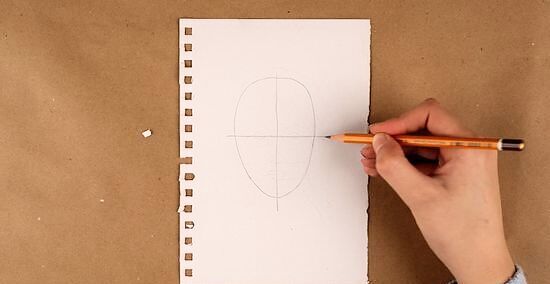
Divide the oval in half vertically and horizontally. The easiest way to draw a face is to use dividing lines to map out the proportions of the features. First, draw a line down the center of the oval. Then cut the oval in half again, this time horizontally.
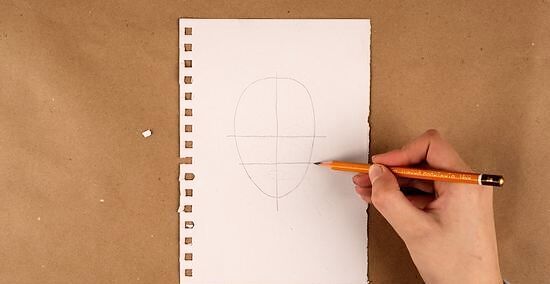
Add another horizontal line to illustrate the nose. Divide the lower half of the oval again with another horizontal line. The point where the vertical line meets the lower horizontal line is the base of the nose. Sketch out the tip of the nose and add a nostril on each side.
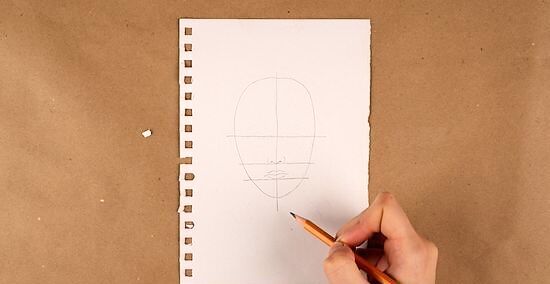
Sketch out the mouth with a third horizontal line. Divide the bottom of the oval in half again. Put the bottom of the lips on the dividing line you have just drawn. Draw a line for where the lips meet and then draw the top and bottom lips.
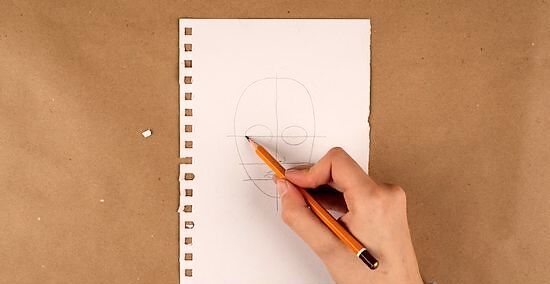
Add two symmetrical eyes along the top line. Draw two circular balls to make out the eyes across the central horizontal line. These are the eye sockets. The top of this circle is where the eyebrows go and the bottom is where the cheekbone sits.
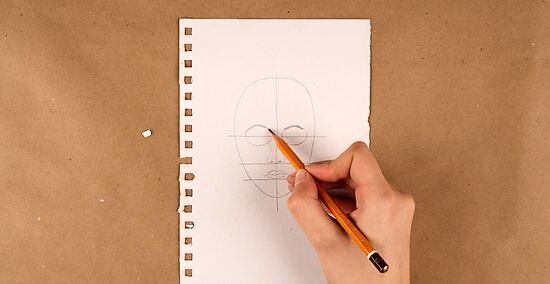
Develop the eyebrows along the top of each eye socket. The eyebrows communicate a lot of expression. Craft the eyebrows evenly along the top line of each ball for a more neutral expression, angle the eyebrows inward for a more intense vibe, or raise them up a little to communicate surprise. Use a series of short, thin strokes to add individual hairs if you’re going for a more realistic look.
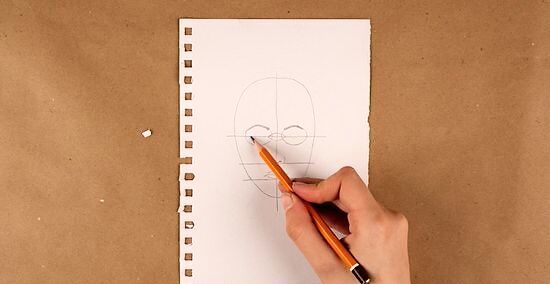
Finish the eyes by adding pupils and eyelids. As a rule of thumb, the distance between the two eyes is the width of a third eye. A person’s eyes are almond-shaped, so bear this in mind as you sketch them out. Eyes come in every size and shape, so experiment with the form a bit until you’ve got the right look.
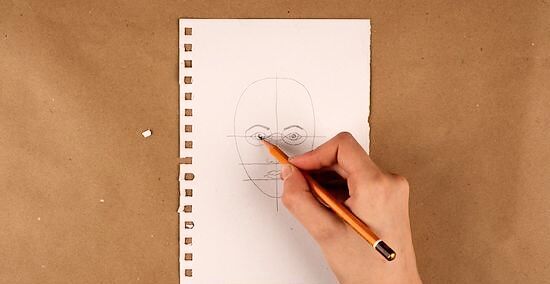
Color the irises and develop the pupils. Draw the pupil, which is the darkest bit of the eye. Fill most of it in black and leave a little white. With your pencil flat, use a bit of shading for the base. Shade variant from medium to light in each iris. Use tightly-spaced short lines from the edge of the pupil to the white of the eye. Make some of the edges of each pupil lighter to give it a nice effect. Develop the eyebrows above. Then, rub out the guidelines below the eye.
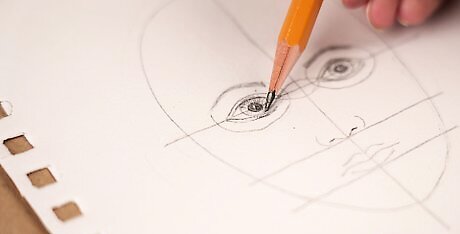
Draw the top of the eyelid over the top of each eye. The base of the eyelid comes down over the top of the iris and covers the top of it slightly. If you make the eyelids really big, the woman you’re drawing will look sleepy. Keep them even and thin.
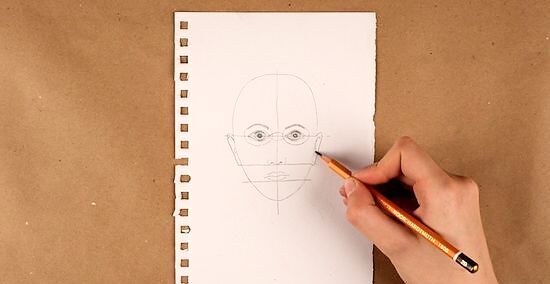
Shade under the eyes to communicate depth. Add a little shading underneath the eye and where the eye meets the nose to define the socket. For a tired look, add shading and swooped lines at a more acute angle to the bottom eyelid.
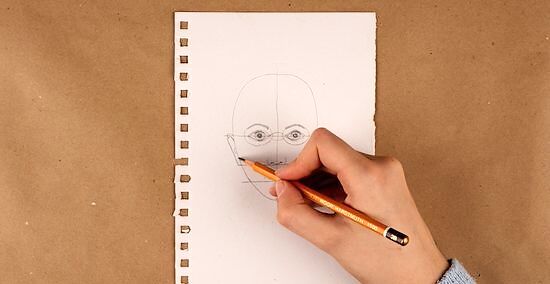
Add an ear on each side of the head. The base of each ear should be drawn in line with the bottom of the nose and the top of the ear in line with the eyebrows. Remember, the ears are flat against the side of the head.
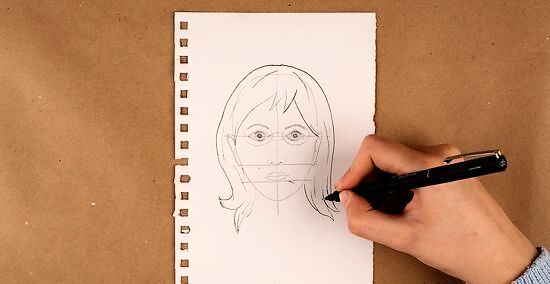
Give your face some hair. Start where the hair parts and develop it outwards. Put some strands in front and other strands behind to communicate dimension. You can opt for whatever kind of hairstyle you’d like. There are no rules, so go for whatever look you want.
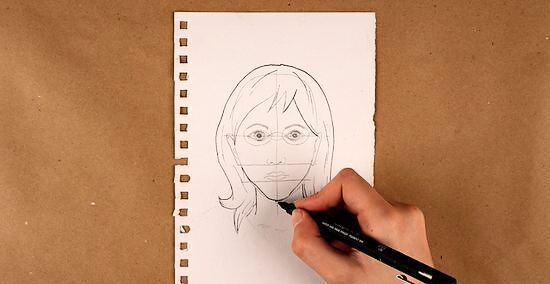
Add the neck coming from the base of the head. Necks are thicker than you probably imagine. Draw two lines coming down from roughly where the bottom horizontal line meets the edges of the face. You can include shoulders if you’d like, or let the neck be the end of the body.
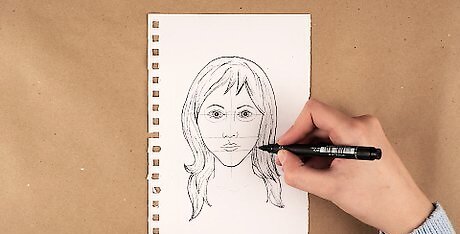
Include any details you feel you’re missing. You can add a bit of shading under the nose and accentuate the chin, or put expression lines around the mouth and shade in the corners. Outline the ridge of the nose. The more prominent you make these features, the older your face will look.
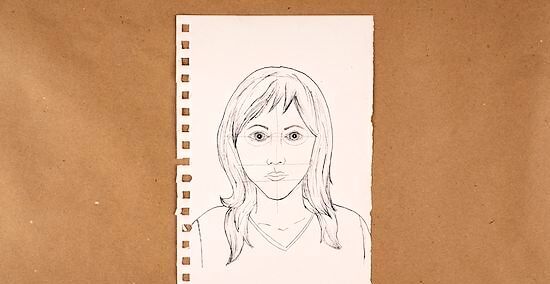
Draw clothes if you want a fuller portrait. Throw on a blouse, shirt, or jacket if you want to add a body. This is totally optional, so if you’re only interested in drawing the face, go ahead and skip this.
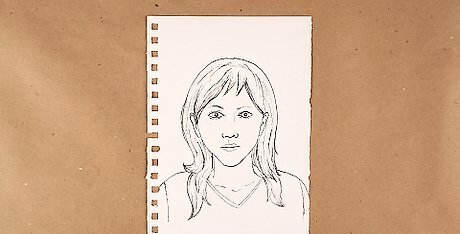
Erase any guidelines you no longer need. Now that you’re done, get rid of any pesky lines that don’t belong anymore. Clean up any marks you didn’t mean to erase and you’re done!
Young Woman
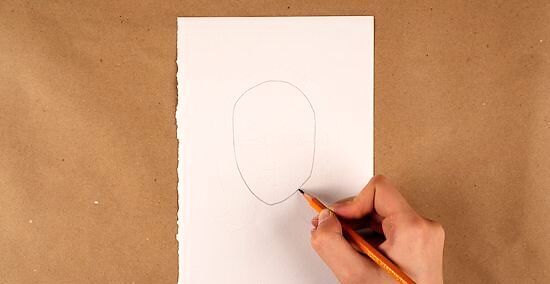
Draw the shape of the head using a loose oval. Craft a loose oval shape to guide the illustration. Heads aren’t perfectly circular, but younger people rarely have sharp chins so don’t make it too sharp.
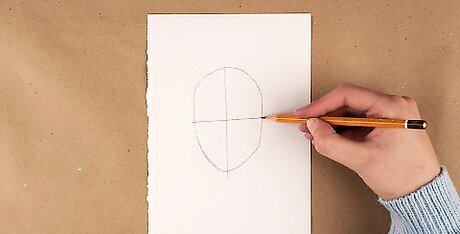
Add guidelines to the center of the face. Put one horizontal line and one vertical line in the center of the oval. This will help you compose the features evenly.
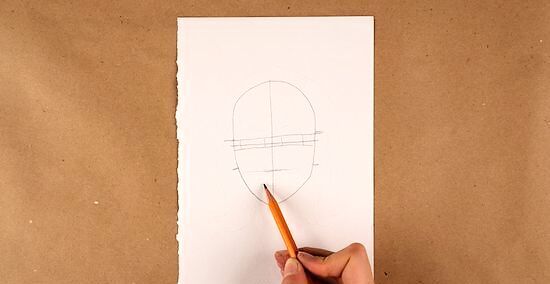
Sketch lines to define the eyes, nose, mouth, and ears. Use your pencil to lightly sketch out the location of each part of the face. Add marks for almond-shaped eyes, note the location of the mouth, and lightly define the nose. Younger women rarely have harsh, sharp noses. If you want to make your drawing appear youthful, use softer lines.
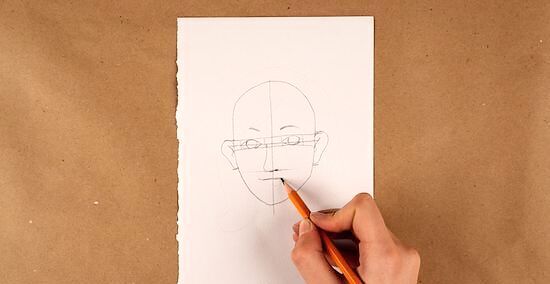
Develop the eyes, nose, mouth, ears, and eyebrows. Feather out some soft and unassuming eyebrows. Fill in the eyes with pupils, and add any lines to the nose and nostrils to give them shape.
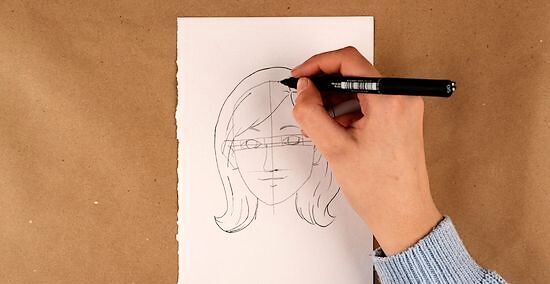
Sketch out the hair and neck. You can even throw a little ribbon or headband in the hairstyle if you want the girl to appear really young. Start where the hair parts and add flowing lines going away from that location.
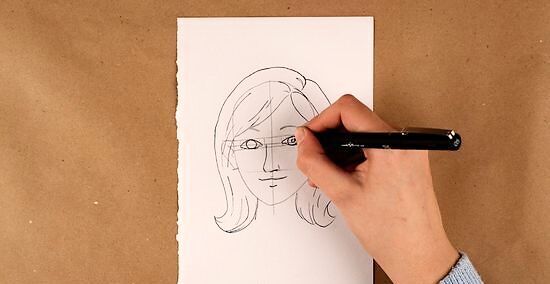
Use a small-tipped drawing tool to add the finer details of the face. Grab a razor-sharp pencil, thin pen, or marker and develop all of the features you’ve added.
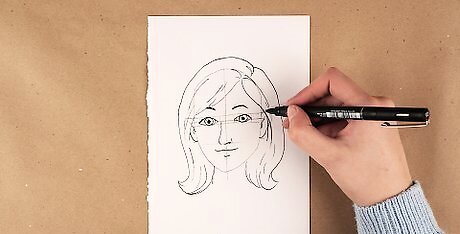
Outline your sketch with your preferred tool. Now that you’ve developed your drawing entirely, add any outlines or features that feel like they’re missing.
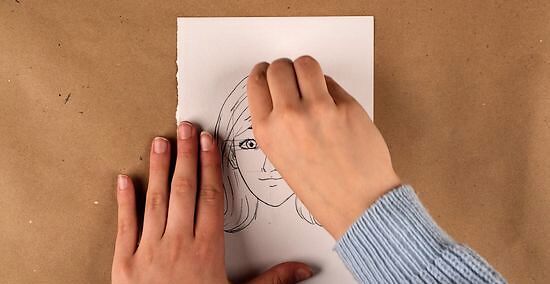
Erase any sketch marks and guidelines to produce a clean drawing. Use your eraser to carefully remove all of the lines you drew to guide your drawing and keep your features symmetrical.
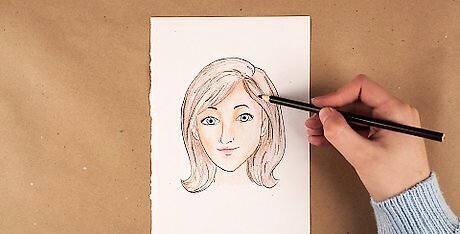
Add color and shading to the drawing. You can keep your drawing black and white if you’d like. Use colored pencils, markers, or crayons to finish your drawing if you’re adding color. You can also shade in the darker parts of the face (like under the eyes and hair) to create more depth.
Young or Adult Man
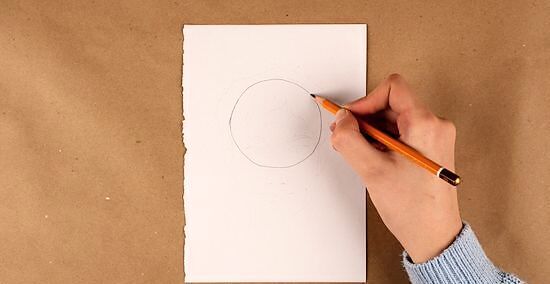
Sketch a light circle. You’ll add the chin later. Don’t worry if your circle isn’t perfectly round—this is just a starting point. You can start with an oval if you prefer, but men tend to have much more angular jawlines. This circle will represent the top portion of the head.
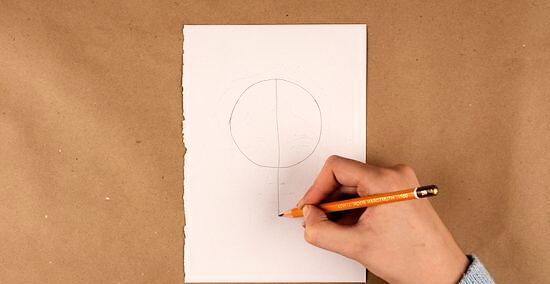
Draw a guideline through the middle of the head. Extend the line down past the bottom of the circle until you reach the bottom of the chin. This line determines where the person is looking, so keep it straight if you want the face to be looking at the viewer.
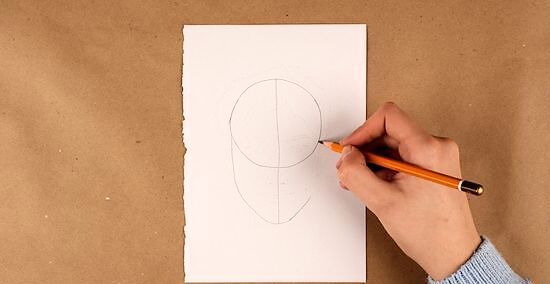
Define the shape of the cheeks, jaw, and chin. Build out the bottom half of the head by adding the jaw lines. The more angular you make the cheeks and jaw, the more “rugged” the face will eventually look. Younger men typically have softer, less developed jaws than adult men do.
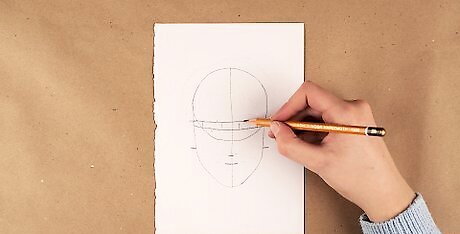
Sketch out the location for the eyes, nose, mouth, and ears. Build out the core locations for each of the man’s main facial features. Place the ears at the same height as the top of the eyes and put the base of the nose halfway between the bottom of the chin and the bottom of the circle.
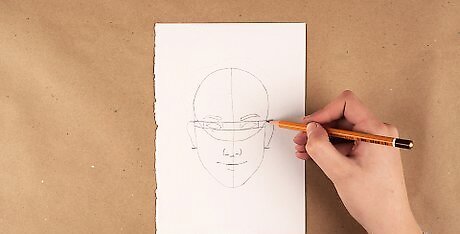
Give some shape to all of the facial features. Build out the eyes, nose, mouth, ears, and eyebrows. Add as much detail as you’re comfortable developing right now.
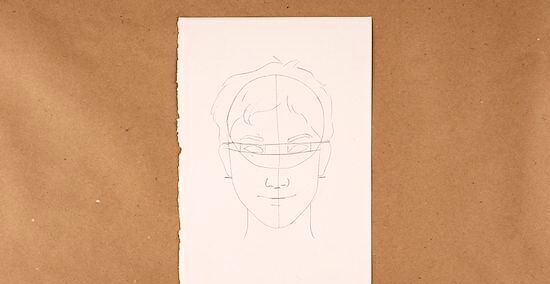
Draw the shape of the hair and neck. You don’t have to craft everything in perfect detail, but develop a sense for the overall composition of the hair. Add a neck, as well. A thinner neck will convey a bit more youthfulness while a wider neck will make the man look older.
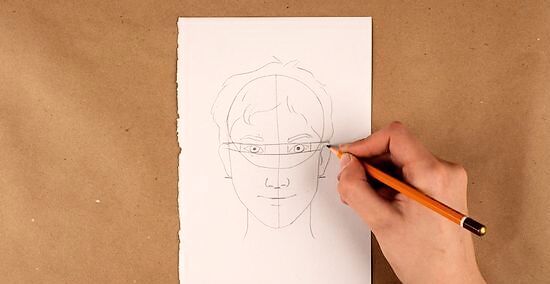
Use a smaller tipped drawing tool to add the finer details. Grab a fine-point pen or sharp pencil and begin to develop the finer details. Add moles, individual hairs, or shading. Now is also a good time to add facial hair! This is one of the best ways to make a man look older.
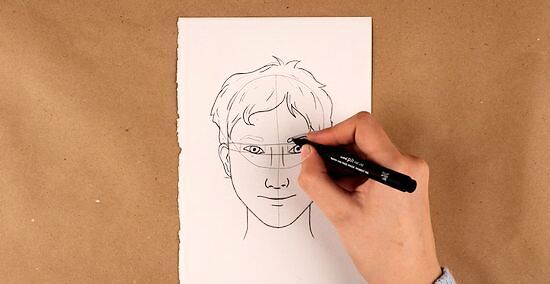
Outline the sketch. Start cleaning up the softer lines with cleaner, crisper strokes. Develop the hair, fill out the eyebrows, and continue to clean up the sketch.
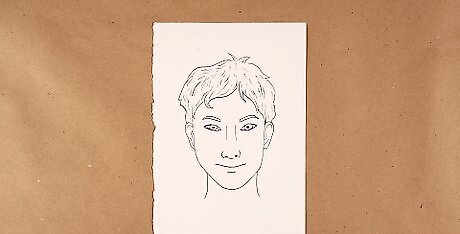
Erase all of the guidelines you sketched out. Grab an eraser and remove all of the original guidelines and any mistakes you’ve made.
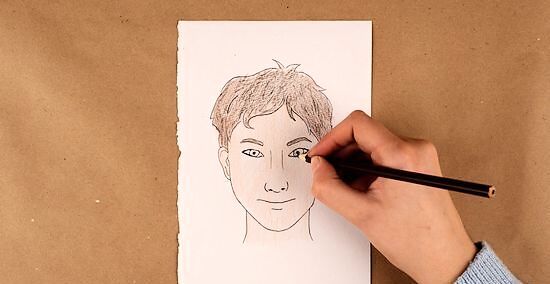
Color in your drawing. It’s totally fine to keep things black and white if you’d like, but now’s the time to add color if you’re going to. Use markers, colored pencils, or crayons to bring your creation to life.
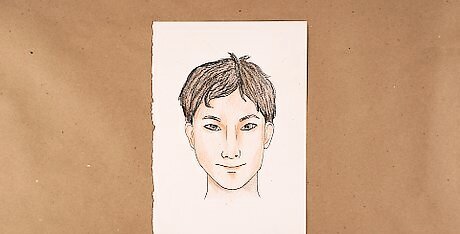
Add shading to the drawing for a more realistic look. You can keep the drawing unshaded for a more cartoonish look, but shading and adding depth is a great way to give your drawing a little extra pop.
















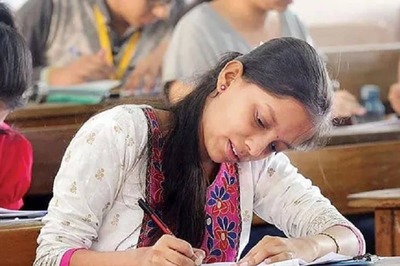



Comments
0 comment